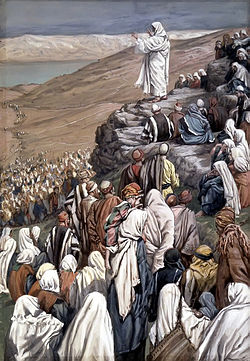- Matthew 5:10
-
Matthew 5:10 is the tenth verse of the fifth chapter of the Gospel of Matthew in the New Testament. It is the eighth verse of the Sermon on the Mount, and also eighth, and to some the last, of what are known as the Beatitudes.
In the King James Version of the Bible the text reads:
- Blessed are they which are persecuted
- for righteousness' sake: for
- theirs is the kingdom of heaven.
The World English Bible translates the passage as:
- Blessed are those who have been
- persecuted for righteousness' sake,
- for theirs is the Kingdom of Heaven.
For a collection of other versions see BibRef Matthew 5:10
St. Augustine was convinced that there should actually be seven Beatitudes, as seven was considered the holy number. He thus felt that this one was not actually a separate one, but rather a rephrasing of the first Beatitude at Matthew 5:3. To Augustine this eighth Beatitude symbolized Christ rising on the eighth day, which was also the first day. As with 5:3 this verse cites the Kingdom of Heaven as the reward, also like that first verse the reward is in the present tense, the other six have it in the future. Kodjak believes that this parallelism with the first verse is to emphasize that this one is the conclusion of the Beatitudes and 5:11-12 should not be considered part of the group.[1] Davies and Allison also agree that the verse "looks like it has been pieced together from other Beatitudes."[2]
Gundry feels the word translated as persecuted should perhaps best be read as hounded. Hill notes that persecuted is a participle in the perfect tense which indicates that Jesus' followers had already been persecuted for their righteousness.[3]
This verse has often been cited as an argument for Christian toleration and acceptance. John Locke prominently cited it in his A Letter Concerning Toleration. This argument was rebutted by inquisitors and others who pointed out that only those persecuted for "righteousness' sake" were to be blessed, something they did not think applied to the enemies of the church.[4]
References
- ^ Kodjak, Andrej (January 1987). A Structural Analysis of the Sermon on the Mount. New York: Walter de Gruyter. ISBN 0-8992-5159-5.
- ^ Davies, W.D. and Dale C. Allison, Jr. A Critical and Exegetical Commentary on the Gospel According to Saint Matthew. Edinburgh : T. & T. Clark, 1988-1997. pg. 68
- ^ Gundry, Robert H. Matthew a Commentary on his Literary and Theological Art. Grand Rapids: William B. Eerdmans Publishing Company, 1982.
- ^ Hill, David. The Gospel of Matthew. Grand Rapids: Eerdmans, 1981
Gospel of Matthew Preceded by:
Matthew 5:9Chapter 5 Followed by:
Matthew 5:11Categories:- Gospel of Matthew verses
- Sermon on the Mount
Wikimedia Foundation. 2010.

